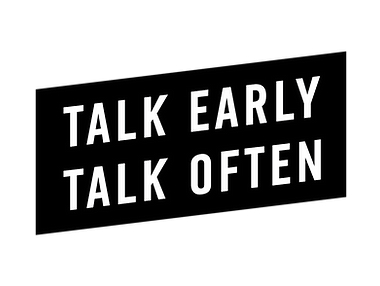
- HOME
- ABOUT US
- WHAT WE DO
- SUBSTANCE
USE PREVENTION - NUTRITION
EDUCATION - HEALTHY FOODS
FOR THE COMMUNITY
- SUBSTANCE
- HOW WE CAN HELP
- NEWS & EVENTS
- GET INVOLVED
Blog
September 29, 2023
Talking Early, and Talking Often

Serious talks are hard with anyone. Serious talks about drugs and alcohol with your teen, or child, can feel impossible, but as a parent there are ways to connect with your children and promote open and positive communication. To start, here are some useful reminders to be prepared for your next chat with your teen:
• Keep an open mind. When a child, or teen, feels judged or criticized they are less likely to be interested in your message. To achieve the best outcome for your conversation, try to maintain a position of neutrality and openness. This can be challenging and may take practice but will become easier with time.
• Put yourself in your teen’s shoes. Think about how you would want to be spoken to when talking about a difficult subject. Imagine how you felt when you were a teenager and think of ways that would have made you more comfortable to talk about a challenging subject with your parents.
• Be clear about your goals. Try writing them down. When you know what you would like to get out of the conversation, you can look back afterward and reflect on what went right, what went wrong, what goals were met, which goals are saved for later, and whether you were able to deliver them effectively.
- Some examples of goals:
- Start an ongoing conversation about my teen’s use.
- Gain insight into the pressures they may be facing with drugs.
- Express concern and support.
- Discuss how they feel about drugs and alcohol in general.
• Be Calm and Relaxed. If you come to your teen, or child, with anger or panic, it will be harder to achieve your goals. If you’re nervous about having a conversation with them, take care of yourself first and find some things to do that will help you relax (take a walk, call a friend, meditate, etc.).
• Be positive and stay positive. If you begin the situation with shame, anger, scare tactics or disappointment your efforts will be counterproductive. Instead, be attentive, curious, respectful, and understanding.
• Don’t Lecture. If you’ve spoken with your children when they were younger, they already know that you disapprove of their use. To lecture them about this will most likely lead to shutting down, tuning you out, anger or misinterpret as you are disapproving of them instead of their actions - this can lead to shame, and in turn more substance use. Avoid pulling rank if you get frustrated to stop something from happening – “You can’t, because I’m your parent and I said so” is highly ineffective.
• Find a comfortable setting. Announcing a sit-down meeting such as, “We need to have a talk after dinner” will usually be met with resistance. A more spontaneous and causal approach will lower their anxiety and maybe even your own. This can mean taking a walk with them or sitting in the yard or park. The best places will be less confined, but not too distracting.
• Be aware of body language. If your child, or teen, is sitting, you’ll want to be sitting as well, and if she is standing, ask her to sit down with you. Be mindful of finger-pointing and crossed arms – this can make you seem closed off, while uncrossed legs and a relaxed posture can make you seem more open.
It’s important to start these talks early, and it’s never too early to talk to your children about drugs and alcohol. Children as young as nine years old already start perceiving alcohol in a more positive way, and in 2022 roughly 3,300 kids as young as 12 try cannabis each day. You are your child’s role model and your views on alcohol, tobacco, and other drugs can influence how they think about them. Make talking about drugs and alcohol a part of your general health and safety conversations, starting as early as elementary school, and continuing from there.
For examples on talking to your children about cannabis visit Cannabis Talk Kit
For more information about Talk early, Talk Often visit Talk Early Talk Often
For tips for talking to your children of all ages visit Tips for Talking to Children About Drugs at All Ages
Resources:
SAMHSA - Why You Should Talk With Your Child About Alcohol and Other Drugs
Sherburne SUP Coalition - Talk Early Talk Often
 MCD Global Health
MCD Global Health